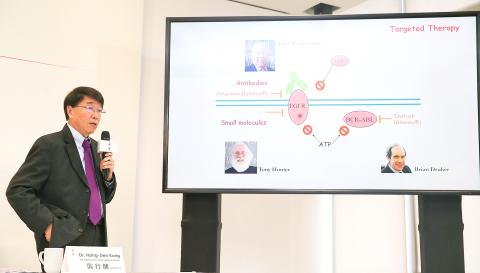Tony Hunter, Brian Druker and John Mendelsohn have won this year’s Tang Prize in biopharmaceutical science for their breakthroughs in developing targeted cancer therapies, the Tang Prize Selection Committee announced yesterday.
Their research and findings of protein tyrosine phosphorylation and tyrosine kinases as oncogenes have led to successful targeted cancer therapies, the committee said.
The three winners, all Americans, have shown how basic science can lead to clinical applications that benefit humankind, said Chang Wen-chang (張文昌), a member of Academia Sinica and the convener of the selection committee.

Photo: CNA
Hunter demonstrated that a mechanism called tyrosine phosphorylation acts as a master on/off switch for a number of key proteins that are critical for successful cancer therapies, the committee said.
Hunter, a professor of biology at the Salk Institute, gave birth to the field of targeted therapies after discovering in 1979 the mechanism of tyrosine phosphorylation and that the oncogene Src is a tyrosine kinase.
The historic discovery paved the way for active research in the following two decades on tyrosine kinase oncogenes, ultimately leading to the development of tyrosine kinase inhibitors (TKIs).
Based on Hunter’s discovery, Druker, the director of Oregon Health & Science University’s Knight Cancer Institute, led the successful clinical trial of a cancer-fighting drug called imatinib.
The drug turned chronic myelogenous leukemia, a cancer that once had a very low survival rate, into a manageable condition.
Gleevec, a brand of imatinib, shuts off oncogenic signals by inhibiting Abl-protein tyrosine kinases as predicted by Hunter’s original research, the committee said.
Gleevec has also been successfully used in the treatment of acute lymphocytic leukemia and certain types of gastrointestinal stromal tumors by inhibiting other tyrosine kinase oncoproteins.
There are more than 26 TKIs that have been approved for clinical use. All of the discoveries have Druker’s first successful trials to thank because they spurred this still burgeoning targeted therapy era, the committee said.
John Mendelsohn, president emeritus of MD Anderson Cancer Center, took another approach to combating cancer.
An alternative way of shutting off the activities of tyrosine kinases on the cell surface (receptor tyrosine kinase) is to develop antibodies against the extracellular domain of the receptor, the committee said.
In such a way, the natural ligand, or growth factor, can no longer bind and the receptor tyrosine kinase is no longer activated. Mendelsohn and his team came up with the idea that antibodies targeting the epidermal growth factor receptor (EGFR) may be an effective strategy for cancer treatment.
Mendelsohn led his team in conducting preclinical research and proceeded to develop the anti-EGFR antibody cetuximab, which eventually won the US Food and Drug Administration’s approval for the treatment of colon cancer and head/neck cancer.

An essay competition jointly organized by a local writing society and a publisher affiliated with the Chinese Communist Party (CCP) might have contravened the Act Governing Relations Between the People of the Taiwan Area and the Mainland Area (臺灣地區與大陸地區人民關係條例), the Mainland Affairs Council (MAC) said on Thursday. “In this case, the partner organization is clearly an agency under the CCP’s Fujian Provincial Committee,” MAC Deputy Minister and spokesperson Liang Wen-chieh (梁文傑) said at a news briefing in Taipei. “It also involves bringing Taiwanese students to China with all-expenses-paid arrangements to attend award ceremonies and camps,” Liang said. Those two “characteristics” are typically sufficient

A magnitude 5.9 earthquake that struck about 33km off the coast of Hualien City was the "main shock" in a series of quakes in the area, with aftershocks expected over the next three days, the Central Weather Administration (CWA) said yesterday. Prior to the magnitude 5.9 quake shaking most of Taiwan at 6:53pm yesterday, six other earthquakes stronger than a magnitude of 4, starting with a magnitude 5.5 quake at 6:09pm, occurred in the area. CWA Seismological Center Director Wu Chien-fu (吳健富) confirmed that the quakes were all part of the same series and that the magnitude 5.5 temblor was

The brilliant blue waters, thick foliage and bucolic atmosphere on this seemingly idyllic archipelago deep in the Pacific Ocean belie the key role it now plays in a titanic geopolitical struggle. Palau is again on the front line as China, and the US and its allies prepare their forces in an intensifying contest for control over the Asia-Pacific region. The democratic nation of just 17,000 people hosts US-controlled airstrips and soon-to-be-completed radar installations that the US military describes as “critical” to monitoring vast swathes of water and airspace. It is also a key piece of the second island chain, a string of

The Central Weather Administration has issued a heat alert for southeastern Taiwan, warning of temperatures as high as 36°C today, while alerting some coastal areas of strong winds later in the day. Kaohsiung’s Neimen District (內門) and Pingtung County’s Neipu Township (內埔) are under an orange heat alert, which warns of temperatures as high as 36°C for three consecutive days, the CWA said, citing southwest winds. The heat would also extend to Tainan’s Nansi (楠西) and Yujing (玉井) districts, as well as Pingtung’s Gaoshu (高樹), Yanpu (鹽埔) and Majia (瑪家) townships, it said, forecasting highs of up to 36°C in those areas